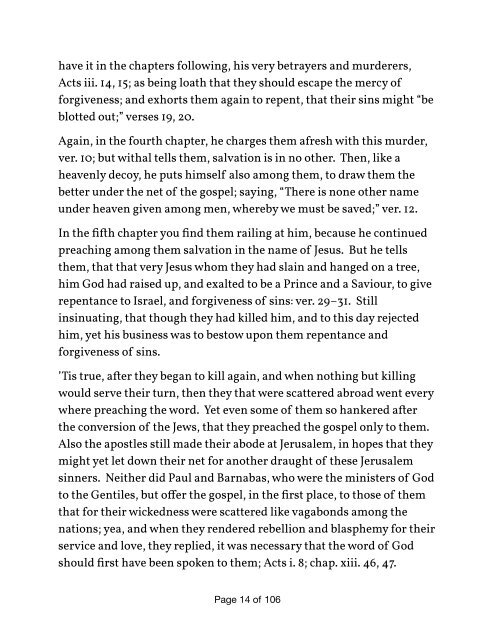The Jerusalem Sinner Saved; or Good News for the Vilest of Men by John Bunyan 1689
An encouraging book for those who feel guilty about their sins. It is a wonderful reminder that Christ's grace to his people knows no bounds and that his power to save even the worst sinner is not limited. "I have been vile myself, but I have obtained mercy; and I would have my companions in sin partake of mercy too: and therefore, I have writ this little book." Thus wrote John Bunyan about this unique gem. The premise of this book is that Jesus wanted his disciples to proclaim the gospel to the worst of sinners - those in Jerusalem who crucified their Messiah. To Bunyan's mind, this was the worst possible sin. The apostles were to begin there, with these worst of sinners, because, in Christ's eyes, they had the greatest need. Also, when they believed in Christ, his name would receive the greatest fame, and thus others would be encouraged to come to Christ. The kingdom of Satan would then be weakened, and the tempted and the weak would be helped. Further, the greatest sinners would love Christ the most when saved, and those who refused to repent would be left with no excuse. To Bunyan's way of thinking, this command to preach the gospel to "Jerusalem sinners" shows the gracious intentions of Christ toward men and his sufficiency to save the worst of sinners, and gives encouragement to those who think that their sin is too great to be forgiven.
An encouraging book for those who feel guilty about their sins. It is a wonderful reminder that Christ's grace to his people knows no bounds and that his power to save even the worst sinner is not limited.
"I have been vile myself, but I have obtained mercy; and I would have my companions in sin partake of mercy too: and therefore, I have writ this little book." Thus wrote John Bunyan about this unique gem.
The premise of this book is that Jesus wanted his disciples to proclaim the gospel to the worst of sinners - those in Jerusalem who crucified their Messiah. To Bunyan's mind, this was the worst possible sin. The apostles were to begin there, with these worst of sinners, because, in Christ's eyes, they had the greatest need. Also, when they believed in Christ, his name would receive the greatest fame, and thus others would be encouraged to come to Christ. The kingdom of Satan would then be weakened, and the tempted and the weak would be helped. Further, the greatest sinners would love Christ the most when saved, and those who refused to repent would be left with no excuse. To Bunyan's way of thinking, this command to preach the gospel to "Jerusalem sinners" shows the gracious intentions of Christ toward men and his sufficiency to save the worst of sinners, and gives encouragement to those who think that their sin is too great to be forgiven.
Create successful ePaper yourself
Turn your PDF publications into a flip-book with our unique Google optimized e-Paper software.
have it in <strong>the</strong> chapters following, his very betrayers and murderers,<br />
Acts iii. 14, 15; as being loath that <strong>the</strong>y should escape <strong>the</strong> mercy <strong>of</strong><br />
f<strong>or</strong>giveness; and exh<strong>or</strong>ts <strong>the</strong>m again to repent, that <strong>the</strong>ir sins might “be<br />
blotted out;” verses 19, 20.<br />
Again, in <strong>the</strong> fourth chapter, he charges <strong>the</strong>m afresh with this murder,<br />
ver. 10; but withal tells <strong>the</strong>m, salvation is in no o<strong>the</strong>r. <strong>The</strong>n, like a<br />
heavenly decoy, he puts himself also among <strong>the</strong>m, to draw <strong>the</strong>m <strong>the</strong><br />
better under <strong>the</strong> net <strong>of</strong> <strong>the</strong> gospel; saying, “<strong>The</strong>re is none o<strong>the</strong>r name<br />
under heaven given among men, where<strong>by</strong> we must be saved;” ver. 12.<br />
In <strong>the</strong> fifth chapter you find <strong>the</strong>m railing at him, because he continued<br />
preaching among <strong>the</strong>m salvation in <strong>the</strong> name <strong>of</strong> Jesus. But he tells<br />
<strong>the</strong>m, that that very Jesus whom <strong>the</strong>y had slain and hanged on a tree,<br />
him God had raised up, and exalted to be a Prince and a Saviour, to give<br />
repentance to Israel, and f<strong>or</strong>giveness <strong>of</strong> sins: ver. 29–31. Still<br />
insinuating, that though <strong>the</strong>y had killed him, and to this day rejected<br />
him, yet his business was to bestow upon <strong>the</strong>m repentance and<br />
f<strong>or</strong>giveness <strong>of</strong> sins.<br />
’Tis true, after <strong>the</strong>y began to kill again, and when nothing but killing<br />
would serve <strong>the</strong>ir turn, <strong>the</strong>n <strong>the</strong>y that were scattered abroad went every<br />
where preaching <strong>the</strong> w<strong>or</strong>d. Yet even some <strong>of</strong> <strong>the</strong>m so hankered after<br />
<strong>the</strong> conversion <strong>of</strong> <strong>the</strong> Jews, that <strong>the</strong>y preached <strong>the</strong> gospel only to <strong>the</strong>m.<br />
Also <strong>the</strong> apostles still made <strong>the</strong>ir abode at <strong>Jerusalem</strong>, in hopes that <strong>the</strong>y<br />
might yet let down <strong>the</strong>ir net f<strong>or</strong> ano<strong>the</strong>r draught <strong>of</strong> <strong>the</strong>se <strong>Jerusalem</strong><br />
sinners. Nei<strong>the</strong>r did Paul and Barnabas, who were <strong>the</strong> ministers <strong>of</strong> God<br />
to <strong>the</strong> Gentiles, but <strong>of</strong>fer <strong>the</strong> gospel, in <strong>the</strong> first place, to those <strong>of</strong> <strong>the</strong>m<br />
that f<strong>or</strong> <strong>the</strong>ir wickedness were scattered like vagabonds among <strong>the</strong><br />
nations; yea, and when <strong>the</strong>y rendered rebellion and blasphemy f<strong>or</strong> <strong>the</strong>ir<br />
service and love, <strong>the</strong>y replied, it was necessary that <strong>the</strong> w<strong>or</strong>d <strong>of</strong> God<br />
should first have been spoken to <strong>the</strong>m; Acts i. 8; chap. xiii. 46, 47.<br />
Page<br />
14 <strong>of</strong> 106

















